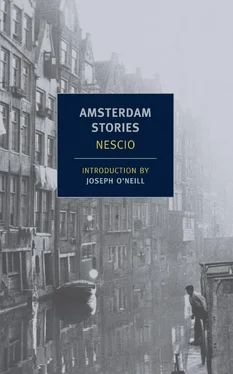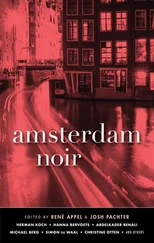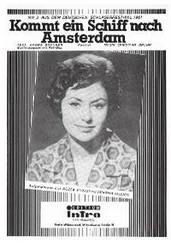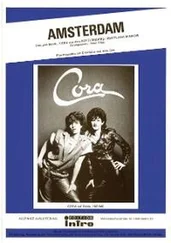And I sat on the edge of my chair the whole time and looked at the ornamental table legs and the gilded frame of the mirror. It was deadly. I had to tell Hoyer about my trip, of course, but I didn’t know what to say, I heard myself talking and listened, scatterbrained, to the sound of my own voice. The light in the room was dim and gloomy, I think the widow was afraid of people looking in. I just wanted to leave, and I looked around at the three walls I could see without turning around in my chair but they didn’t dissolve, I couldn’t see through them. I looked at the door — I couldn’t help it — I sat there staring helplessly. My eyes were just drawn to the door. I had vague visions of Cunera, of the Grebbeberg with its river, of the sunny square in front of Centraal Station and the clockface gleaming on the Oude Kerk spire, and through these semitransparent visions I saw the painted grain of the fake oak wood on the door. Someone was talking the whole time, oh, right, Hoyer. Then I myself answered, or not actually my self, but my tongue did move and sounds did come out of my mouth, I could hear them loud and clear.
Hoyer didn’t notice anything . His studio was upstairs. Shall he lead the way? I numbly followed. “This must be the lavatory?” I thought something along those lines was the proper thing to say when a gentleman was showing you his house. Hoyer didn’t notice anything . “No, that’s a closet,” he said. And I thought, why didn’t he say, “I beg your pardon, that’s a closet”? Surely that’s what he would be saying within a year or two.
The hall was a tight squeeze, the runner was narrow, the stairs proportioned accordingly, there was a thin banister with slightly turned posts, but everything was very fine and in good taste, I have to admit. Hoyer still didn’t notice anything.
Upstairs I recovered a bit, at least there was light, the famous “studio light.” The easel stood empty. There was an expensive chair in the studio and I sank into it. Never in my life had I sat in such a chair. Hoyer was painting portraits these days, of ladies and gentlemen, all in elegant clothing. He showed me the portrait he had just started of the lawyer in the building. She was traveling at the moment. Hoyer used to have his studio in another building at first, but the lawyer had convinced “Madame” to allow part of the attic to be converted into a studio. They had had a hard time persuading her and managed to only when she heard that Hoyer was going to paint a portrait of a young lady from Willemsparkweg, in winter hat, boa, and muff. And the rest of her clothes too, of course. And that he had been put forward as a member of Arti et Amicitiae.
Did Bavink ever come by? No, never, he’d never been here. Had he heard anything about Kees? Yes, Bavink had run into Kees on the street a while back and they had talked. He had gone through three or four jobs in the past couple years, with long stretches unemployed in between. His father had finally found him something with the gas company.
“He walks around now in a uniform and a cap, he has Amsterdam’s three white Xs and ‘AmGas’ on his head and a little book under his arm. And another guy with him, with a black bag.” Bavink found it quite a sight. His job is to go around emptying the two-penny coins out of the gas meters, the other guy’s job is to carry them around his bag. And after they’ve gotten the coins out, Kees has to go ask the lady of the house if she wants twopenny coins back again in change for the meter. Bavink spent a while with him, he had never walked along with someone doing that before. But it got boring fast. He never did it again.
I gazed at the Bokhara carpet lying in front of the club chair and saw clearly before my eyes the deserted cobblestones of Linnaeusstraat and the blue limestone curb and the seam where two stones were set next to each other, and the bricks of the sidewalk. I saw us sitting there in the summer night. Bavink and Bekker and Kees and Hoyer and me. I saw that the cobblestones and the dust on the street were wet, the watering cart had been by, there was a wet sheet of newspaper somewhere. And I heard Hoyer say that he was standing up, the cold from the stone was seeping into him. Now I was hearing the same voice, only a little more refined, more modulated, saying: “You must excuse me, Koekebakker, I have a consultation at eleven.”
Outside, the spring sun shone down on the cheerless street. My God, how could a street like this exist. I was absolutely not allowed to kiss the girl in the tram but a street like this was allowed to exist. That was allowed.
XI
On one of the grand canal streets I stood on the stairs and read on the door: “P. Bekker, Agent, Sales on Commission.” I rang the bell and waited. It took a long time. Then the top half of the door swung open and I saw a young man with a blockish head. “Is Mister Bekker in?” That sounded strange. While the young man opened the bottom half of the door, not without some difficulty, I remembered how the front door used to open without my seeing anyone, there was a cord he could pull from upstairs, and I would yell “Hi, Bekker!”
“Is Mister Bekker in?” Mister Bekker was with someone at the moment. A large roll of carpets was lying in the marble passageway. “Who may I tell him is here?” “Koekebakker.” “Would you follow me, please?” The young man went first, up a narrow staircase that changed direction too many times to count.
Upstairs, at the end of a dark narrow hallway, he stopped. In the dim light I could just make out the words “Samples Room.” “Is this where I’m supposed to wait, friend?” I asked, pointing at the words. I could tell that Friend found me a bit odd. “We’ve just never changed the sign, sir.” He knocked.
I heard Bekker’s voice call out “Yes.” The friend went in and the door shut behind him and there I was.
Would I be so kind as to wait here? I was led to a small back room with a view of a blind wall. A massive roll of packing paper hung on a bar from the ceiling, with the end of the paper hanging down above a large, empty packing table. The young man went and sat at a little desk by the window, with his back to me, and started to tap on a typewriter. I looked at the packing paper hanging there, I saw that it had been torn off at an angle, I looked at the office worker’s broad, bent back and bony shoulders and at the blind wall out the window. One of the bricks was broken and dark red inside; that crumbled piece of brick was the most beautiful thing I saw.
The worker typed away at God knows what. Whenever he stopped for a moment I could hear two men’s voices through the closed door, and recognized Bekker’s voice without being able to make out any words. I sat there for twenty minutes, dying. Per me si va nella città dolente. *
Then the door opened and Bekker appeared. He was nervous and embarrassed. How was I doing? I looked good. He was terribly sorry. He was with a client, from Bordeaux, the man had come especially to see him. He didn’t think he could get rid of him before late that evening…. “You understand — man, you sure look good. Just back from Algiers?” I understood perfectly. Yes, back from Algiers. “Where are you staying? If I can I’ll come by and see you at nine tonight.” I wasn’t staying anywhere, I was out of money, but that’s not something you can say in an office with a stranger standing right there. So I said I didn’t know yet. I’d drop by again later. “Better luck next time!” I knew he’d say that. It’s one of those things that fine men and women say to each other where you don’t even need to listen.
He brought me to the front door. He thought it was a damn shame. I looked at the little sign, “P. Bekker, Agent, Sales on Commission,” then into his eyes. And I saw that he suddenly heard it too, the cow mooing, the cow in the twilight ten years ago that you could hear but not see. We shook each other’s hand. “ Per me si va tra la perduta gente , Koekebakker.” He held my hand tight and put his other hand on my shoulder. “Let me know if you need any money, okay?”
Читать дальше



![Олеся Проглядова - Nomen nescio. Имя неизвестно [litres]](/books/391740/olesya-proglyadova-nomen-nescio-imya-neizvestno-lit-thumb.webp)








